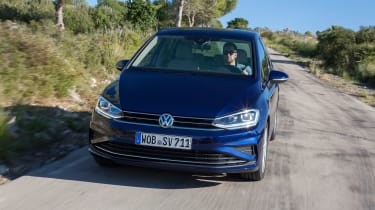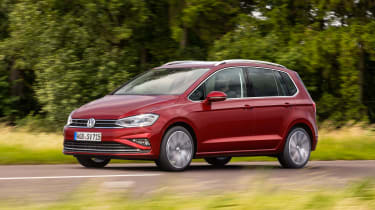Volkswagen Golf SV MPV - Engines, drive & performance (2014-2020)
There's an excellent line-up of engines available in the VW Golf SV range
To drive, the Volkswagen Golf SV feels very much like the standard Golf, but with some extra lean in corners due to the fact that the SV is taller, wider and longer than the regular model. The steering isn't quite as sharp, but the suspension keeps the comfortable feel of the normal car.
There's very little separating the two cars when it comes to fun behind the wheel. The handling is responsive and the Golf SV holds the road surprisingly well, with only a little more body lean noticeable compared to the hatch.
In GT trim level, the SV comes with stiffer sports suspension, which seems an unusual feature for a family-focused MPV. Combine this with the GT’s 17-inch alloy wheels and the ride is a little firmer than we’d like on this type of car. Annoyingly, you can’t swap the stiffer set-up for regular suspension like you can with an Audi S line model. So if you want the GT with all its extra kit as well as a comfortable ride, you’ll need to spend an extra £830 for adaptive dampers, as these feature a comfort mode.
The S model comes with smaller 15-inch steel wheels, meaning its ride is slightly more cushioned compared to other trim levels.
Volkswagen Golf SV petrol engines
The petrol engine range starts with a 1.0-litre engine that makes 84bhp. It’s refined, and powerful enough with a driver and passenger, but with a full load, this engine will struggle on a motorway cruise.
More reviews
Car trim reviews
In-depth reviews
- Volkswagen Golf R review – the ultimate hot Golf
- Volkswagen Golf review - the go-to family hatchback
- Volkswagen Golf R estate review
Used car reviews
The 113bhp version is much easier to recommend. Fitted with the optional DSG gearbox (£1,415), it’s a very relaxing experience, with the transmission flicking between gears at exactly the right time. It's not as smooth pulling away from a standstill as a normal automatic gearbox, but then that’s the case with most dual-clutch systems.
Two versions of VW's 1.5-litre EVO petrol engine are available, producing 128 and 148bhp. The former is available with manual or DSG automatic gearboxes, the latter is manual-only. We've tried the low power version, and found it plenty powerful for most drivers and extremely smooth and quiet.
If you're set on a petrol engine, we’d recommend the efficient 1.0-litre. It offers a rather enjoyable driving experience, is quiet and smooth at motorway speeds and only reminds occupants that it’s a small, three-cylinder engine when idling.
Thanks to the turbocharger, there’s reasonable power, too. Going from 0-62mph takes 10.5 seconds and overtaking is relatively easy thanks to a slick-shifting six-speed manual gearbox. Despite being intended as an economical choice, the 1.0-litre TSI also happens to be the most fun to drive, with its lighter weight helping the SV to feel more agile in corners.
Diesel engines
For drivers covering more miles annually, the diesels may be a better bet. The range starts with the 1.6-litre TDI which has 113bhp and gets from 0-62mph in 11.1 seconds. It’s smooth and refined, although it has long gearing for efficiency and this can cause it to feel a little lethargic when faced with motorway inclines.
There’s also a 148bhp 2.0-litre TDI diesel, which cuts the 0-62mph time to 9.3 seconds and is only available with an automatic gearbox. More importantly, it’s the most able if you spend lots of time at higher speeds or need to haul heavy loads frequently. This blend of performance, ability on the motorway and low running costs make it our top pick for high-mileage drivers.













